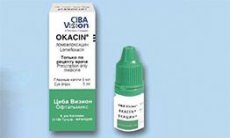Medical expert of the article
New publications
Preparations
Ocacin
Last reviewed: 03.07.2025

All iLive content is medically reviewed or fact checked to ensure as much factual accuracy as possible.
We have strict sourcing guidelines and only link to reputable media sites, academic research institutions and, whenever possible, medically peer reviewed studies. Note that the numbers in parentheses ([1], [2], etc.) are clickable links to these studies.
If you feel that any of our content is inaccurate, out-of-date, or otherwise questionable, please select it and press Ctrl + Enter.

Ocacin is an antimicrobial ophthalmologic agent of the first-generation fluoroquinolone antibiotic group. ATX code S01AE04, J01MA07. International name - Lomefloxacin; other trade names: Lomecin, Lomeflox, Lofox, etc.
Indications Ocacin
Ocacin eye drops are used in the treatment of such ophthalmological diseases as acute and chronic bacterial inflammation of the mucous membrane of the eye (conjunctivitis), inflammation of the eyelids (blepharitis), inflammation of the cornea (keratitis), inflammation of the lacrimal sac (dacryocystitis) and other eye infections.
Release form
Eye drops 0.3% in 5 ml bottles.
Pharmacodynamics
Ocacin exhibits bactericidal activity against many gram-negative and some gram-positive aerobic microorganisms (Staphylococcus saprophyticus, Staphylococcus aureus and Staphylococcus epidermidis), as well as Chlamydia trachomatis. The drug is ineffective against Streptococcus spp., Streptococcus pneumoniae, Pseudomonas cepacia, Ureaplasma urealyticum, Mycoplasma hominis and anaerobic bacteria.
The active substance of Ocacin - lomefloxacin hydrochloride - blocks the action of bacterial enzymes (topoisomerase II and IV), thereby stopping the process of transcription and replication of their DNA, protein synthesis and other biochemical processes that ensure the viability of bacterial cells.
Pharmacokinetics
Data on the absorption of Ocacin eye drops after intraconjunctival application are not provided.
Dosing and administration
Ocacin eye drops should be instilled into the lower conjunctival sac: at the initial stage of treatment - one drop every 5 minutes for 25 minutes or one drop per hour for 8 hours. In the following days, one drop should be instilled into each eye 2-3 times a day. The duration of the course of treatment is 7-9 days.
 [ 2 ]
[ 2 ]
Use Ocacin during pregnancy
Contraindicated
Contraindications
Contraindications to the use of the drug are hypersensitivity to fluoroquinolones, soft contact lenses, childhood (under 15 years).
Side effects Ocacin
Side effects of Ocacin manifest themselves in the form of a quickly passing slight burning sensation in the eyes after instillation. Also, after local application, allergic reactions to ultraviolet radiation (shortness of breath, urticaria, erythema, itching of the skin) are not excluded, which often occur with the systemic use of the tablet form of lomefloxacin. Therefore, during the period of use of this drug, it is better to hide from direct sunlight.
 [ 1 ]
[ 1 ]
Overdose
Storage conditions
Store in a dark place out of reach of children (list B), at room temperature.
Shelf life
The drug in an unopened bottle – 3 years.
Attention!
To simplify the perception of information, this instruction for use of the drug "Ocacin" translated and presented in a special form on the basis of the official instructions for medical use of the drug. Before use read the annotation that came directly to medicines.
Description provided for informational purposes and is not a guide to self-healing. The need for this drug, the purpose of the treatment regimen, methods and dose of the drug is determined solely by the attending physician. Self-medication is dangerous for your health.

